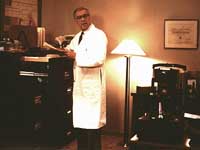Crimes and Misdemeanors (1989)

"It's a fundamental difference in the way we view the world. You see it as harsh and empty of values and pitiless, and I couldn't go on living if I didn't feel with all my heart a moral structure, with real meaning, and forgiveness, and some kind of higher power, otherwise there's no basis to know how to live!" Ben (Sam Waterston), Crimes and Misdemeanors
Woody Allen is always able to get great performances from his cast, but perhaps the best performance ever given by a male lead is the one turned in by Martin Landau in 1989's Crimes and Misdemeanors (the worst being, hands down, Kenneth Branaugh's faux-Woody turn in Celebrity, but I digress). Landau's role is one of the more complex that Allen has ever written, and the often brilliant actor captures each line, each anxiety, each insecurity that Allen has created within the film. In fact, Allen himself stated in an interview that Landau is the best actor that he has ever heard perform his lines; praising Landau for being able to capture each word, each inflection, exactly as Allen heard them in his head while sitting on his bed writing them. And though there are many characters who inhabit Crimes and Misdemeanors, the film definitely belongs to Martin Landau.
Landau plays Judah, a middle-aged Jewish man who faces some of the most important moral questions of life throughout the course of the film. You see, Judah is happily married - but nonetheless engages in an affair with Dolores (Anjelica Houston), a less than stable woman who falls in love with him and longs for him to leave his wife. Of course, Judah never plans to leave his wife, and after a (long) time this finally becomes apparent to Dolores. In reaction, she threatens to tell Judah's wife about the affair if he doesn't do something about the situation soon. Judah is more than a bit distressed: he cares for Dolores but doesn't want to ruin his life over her - he loves his wife, and is a well-respected eye doctor who doesn't need such a scandal in his life.
Judah's brother, a man somehow involved with the crime underworld, assures Judah that he knows people who can take care of the problem for a certain amount of money. Judah is quite angry at first, lashing out at his brother. However, once Delores sends a letter to Judah's wife that Judah luckily intercepts first, he calls on his brother to make his problem "disappear".
He does so.
One of the more chilling scenes in any Allen film ever made comes about half way through Crimes and Misdemeanors as Judah, distressed at what he has done, leaves his house and goes to Dolores' apartment. There he finds her, lying dead on the floor with her eyes wide open, a repulsive sight that causes him to break down. He knows what he has done is wrong and he soon learns to await his punishment from a moral universe.
The rest of the film deals with morality and the nature of God in very powerful ways; a modern twist on Bergman's notion of God's silence. Sam Waterston, an Allen regular by this point, turns in a compelling performance in the role of the Jewish rabbi who is going blind, as does Houston as Judah's mistress. But at the center of the film, holding it all together and lending it an enormous amount of credibility, is Martin Landau's superior performance.
In the film's other, more humorous story line, Allen himself plays a struggling filmmaker trying to capture the affection of Mia Farrow, a local producer. Allen is all but forced to produce a documentary on the life and work of Lester (Alan Alda in a hysterical performance!), his brother-in-law who annoys him to no end. As he attempts to woo Farrow, so to does Lester, and the battles and remarks that pass between them give the film some much needed comic relief. Much as in Hannah and Her Sisters, Allen's role is both humorous and poignant, dealing with issues that aren't central the film, but which give us a "break" so to speak. In fact, Crimes and Misdemeanors is an amazing work precisely because it is able to so easily blend intelligent humor with heavy, moralistic quandries. It's an accomplishment that ranks with the best of Allen's work, and a feat that few, if any, modern filmmakers would be able to pull off.
Release Date: October 13, 1989
Domestic Total Gross: $18,254,702
Distributor: Orion
back to the Woody Allen filmography